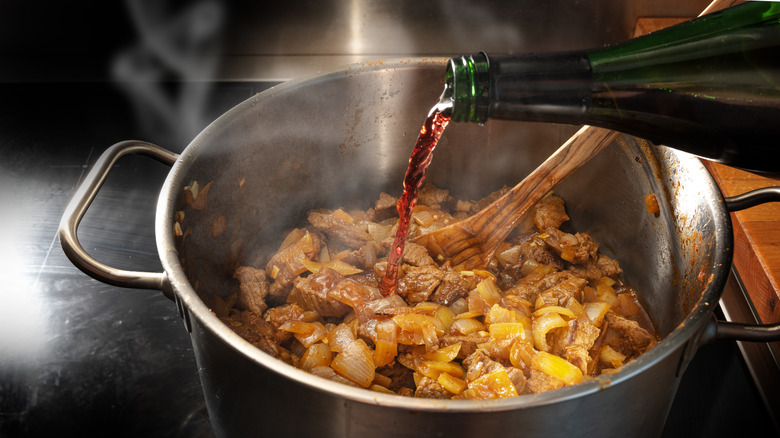The Wine Varieties You Should Absolutely Avoid Cooking With
Beyond the tip that you should only cook with wine you would drink, there isn't much common knowledge when it comes to choosing a wine for cooking. But this lack of guidance doesn't need to stress you out, as cooking with wine isn't the same as drinking it. While there might be a slight change in your dish's flavor when using a cabernet over a pinot noir, cooking removes many of the wine's distinctions and in most recipes, the swap will be pretty hard for the average person to detect. But some characteristics, like sweetness or acidity, can make a notable difference.
If your recipe calls for a dry red or white wine, it would be wise to not substitute that with something overly sweet. Adding sugar in any form — wine or otherwise — will naturally mean significant changes to your dish's flavor, so sweet wines are a definite no when it comes to cooking if your recipe doesn't call for you to use one.
Sweet wine varieties to avoid when cooking (and a few you can try)
Sweet wines run a gamut of styles, and all of them should be avoided when cooking unless you're making a dessert that specifically calls for it. If you are cooking with white wine, that means no riesling or moscato, no matter how much you may like your bottle. There aren't as many sweet reds you need to worry about outside of the obvious dessert wines like port, but there are "late harvest" varieties of normally dry grapes like zinfandel that are much sweeter, so look out for that label. Even off-dry or semi-sweet wines may not be the best choices because you are cooking down your wine most of the time, which concentrates the sweetness.
If you do want wine with a touch of sweetness that won't overwhelm a dish, opt for dry wines that lean fruity. Merlot or malbec have a more subtle sweet factor that won't be as dry as a cabernet and pinot noir. Sauvignon blanc or chardonnay are good options for white wines that can be light and fruity while still being crisp and not overly sweet. In the end, you have a lot of leeway with your wine choices when you cook, and as long as you don't pour out anything labeled "sweet" or "semi-sweet," you should get good results.

